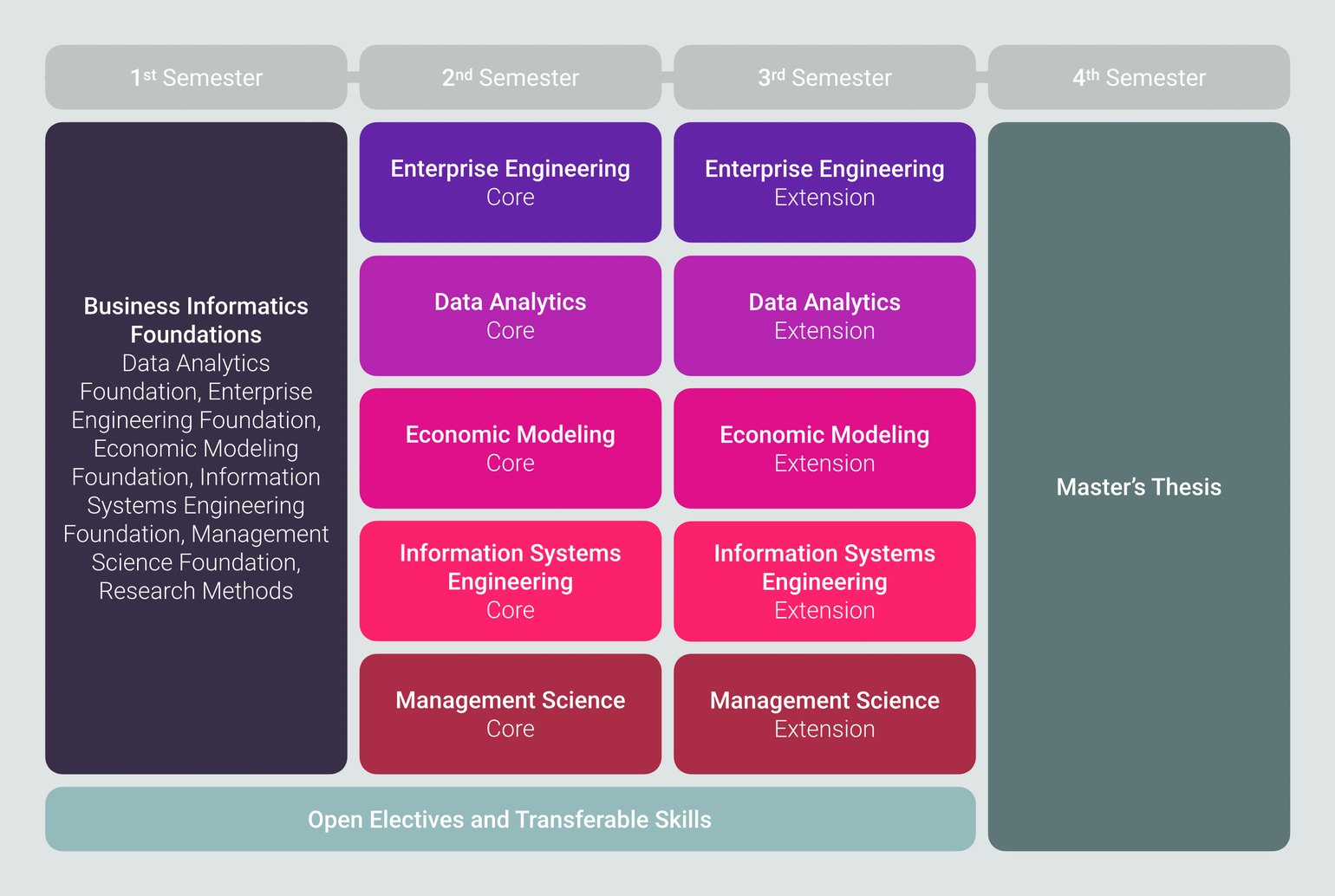Master Business Informatics
Shape the digital backbone of tomorrow—if you want to design the sociotechnical systems that drive business, technology, and society, then this is the right master’s program for you!

Facts
- Duration: 4 Semesters
- ECTS: 120
- Degree: Dipl.-Ing. (equivalent to MSc)
- Language: English
- Curriculum: PDF / Courses
- Questions? — We have answers
Diese Seite in Deutsch.
About
Whether you’re intrigued by e-commerce, or eager to bridge the gap between tech innovation and real-world business challenges, our master’s program Business Informatics gives you all the skills you need to design, develop, and manage intelligent systems that power business. Digital technologies are at the heart of today’s economy—and Business Informatics is the science behind it. This master’s program equips you with the technical skills and strategic thinking to shape digital strategies, streamline operations, innovate entrepreneurial ventures, and provides you with the knowledge and skills to launch a successful career in both academia and the private sector.
What to expect?
We build from the basics: You’ll learn all important fundamentals of data analysis, systems engineering, economic modelling, and management and organization practices. You’ll explore the powerful combination of technology, data, and business—all within practical, real-life contexts that reflect the complexity of today’s corporate world. You’ll approach challenges by interpreting analytics and turning insights into impactful business strategies. Learn how to leverage data to design, streamline, and optimize processes that drive business and economies. You’ll be part of a dynamic, international research community—collaborating closely with faculty, researchers, and fellow students.
Why all this?
Because in our modern economy, business and IT are no longer separate worlds—they’re deeply interconnected. By combining technical expertise with business acumen, you’ll learn how to design digital strategies, streamline operations, and turn data into valuable business insights. With a master’s degree in Business Informatics, you have a bright career ahead of you—not only in terms of salaries but also in shaping the future of business.
Curriculum

The first semester is dedicated to getting around the foundations of Business Informatics with the modules Data Analytics Foundation, Enterprise Engineering Foundation, Economic Modeling Foundation, Information Systems Engineering Foundation, and Management Science Foundation. The foundational modules are complemented by a module in Research Methods.
Over the course of the second and third semesters, you’ll deepen your knowledge in four key areas with core and extension modules that build on the foundational modules.
The focus in the fourth semester lies on developing and writing up your master’s thesis.
Throughout your studies, a well-balanced set of open electives and extension courses deepen your knowledge of core competencies in Business Informatics, and allow you to explore interdisciplinary areas, apply management and economic modeling concepts in broader contexts, and develop valuable secondary skills.
Environment
You are deeply immersed in a rich environment full of exciting ideas and interesting challenges that foster your talents and provide new experiences:
- Participate in our student mobility programs! International exchange is in our DNA. Meet students, researchers, and lecturers from all over the world, participate in Erasmus, and join our double degree programs during your Masters.
- Show your excellence! With our TU Wien Informatics Awards, we celebrate outstanding student accomplishments at all levels and share them with the entire TU Wien community.
- Come for the Master; stay for the Doctorate! A master’s degree is the ideal preparation for a doctorate at the TU Wien Informatics Doctoral School. And we are always looking for excellent candidates for open positions in the scientific field.
- Get to know the people and research! We are proud of the distinguished scholars and researchers who make up our diverse faculty. Find out who they are, what projects our research units are working on, and stay in touch through our newsroom and social media channels.
- Enjoy Vienna! Our campus is located directly in the heart of Vienna. Besides Vienna ranking as the city with the highest quality of life and TU Wien Informatics in the Global Top 15% in Computer Science, there are numerous more reasons why you should study with us.
Be part of TU Wien Informatics and help us shape the technologies of the future - today!
Frequently Asked Questions
Which program is right for me?
How do I apply?
Can I send you my application documents for a pre-check?
I have questions about the formal application process or language requirements.
How is my application evaluated?
Your application is processed in three steps:
The admission office checks whether your application meets certain formal requirements. You need a degree on level 6 (bachelor) or higher in the European Qualifications Framework, and it should have been awarded by a recognized institution (classified as “H+” in ANABIN). Depending on your country of origin, further conditions may apply.
We check whether your bachelor degree covers certain essential topics. If it does not, we have to reject the application. These topics are: algorithms and data structures, programming, mathematics, and statistics; for details see the modules INT/ADA, INT/PRO, STW/ADM, STW/ANA, and STW/STA of the bachelor’s program in Business Informatics at TU Wien.
We check whether the documents you have supplied with the application (like degrees, transcripts, certificates) allow us to conclude that your expertise in computer science, economics, business informatics, and mathematics suffices to follow the master courses successfully.
At the moment, there is no restriction on the number of students admitted per term. You therefore don’t have to compete against other applicants for a limited number of places.
What are the admission requirements?
We check your documents (like transcripts and certificates) for expertise in the following four areas:
- Computer Science (23 ECTS): Programming; algorithms and data structures; database systems; distributed systems; software engineering; IT project management; …
- Business Informatics (28 ECTS): Modeling of data, processes, and enterprises; web engineering; enterprise information systems; security; legal aspects; …
- Economy (18 ECTS): Cost accounting, business management, operations research, micro- and macro-economics, marketing, investment and financing; …
- Structural Sciences (18 ECTS): Mathematics like algebra, analysis, and discrete mathematics; theoretical computer science; logic; …
The numbers in parentheses indicate the extent of the area, measured in credits according to the European Credit Transfer System. One ECTS corresponds to 25 hours of student work, 60 ECTS correspond to the work load of a year.
We are not picky about single ECTS credits, but you need a solid foundation in these four areas to be admitted without further conditions. If you lack some of these foundations (up to 30 ECTS), you can be admitted under the condition that you do some extra courses to make up for it.
Will I be admitted with or without conditions?
If you have completed your bachelor degree in Business Informatics at TU Wien you will be admitted without further conditions. If you have completed one of the bachelor’s programs in Informatics at TU Wien you will be admitted, but you will have to do extra courses on economics.
Otherwise we check, based on the documents that you have provided with your application, whether you have the necessary prerequisites for mastering the courses in the programme. If you have, you will be admitted without further conditions. If not, we compile a list of missing prerequisites. If they sum up to a term (half a year) or less, you will be admitted under the condition that you do some extra courses. You don’t have to do them in advance, but can do them side-by-side with the regular master’s program, as we check their completion only at the end of your studies here.
If the missing prerequisites exceed a full term, we have to reject your application.
